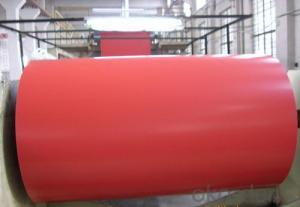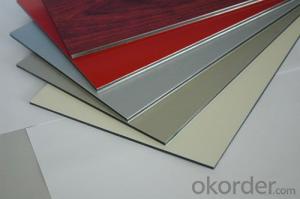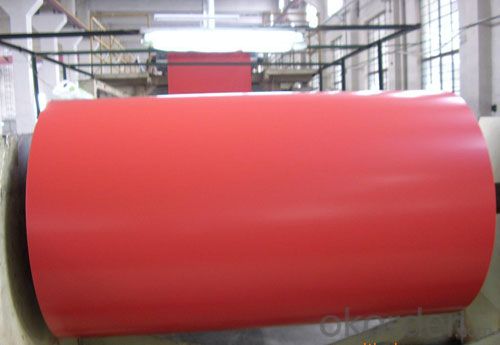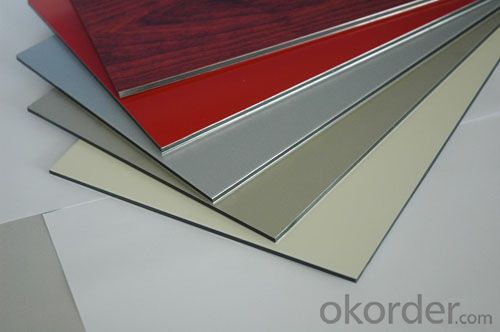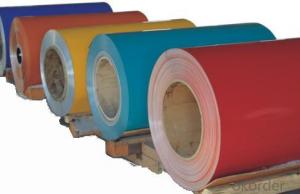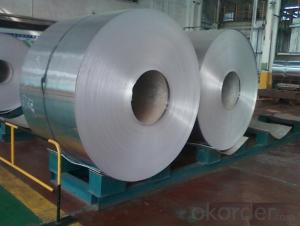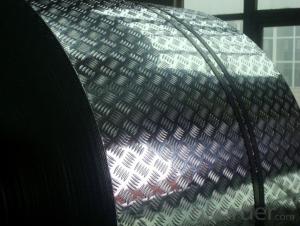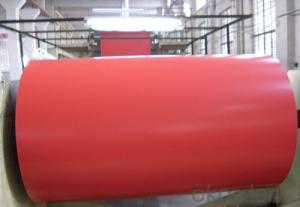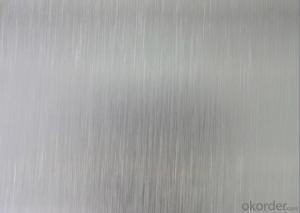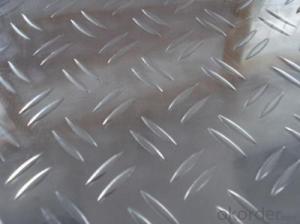Aluminum Coil Minnesota Painted Aluminium Sheets Plates for Wall Decorations
- Loading Port:
- China main port
- Payment Terms:
- TT OR LC
- Min Order Qty:
- 3 m.t.
- Supply Capability:
- 5000 m.t./month
OKorder Service Pledge
OKorder Financial Service
You Might Also Like
Specification
1.Description of Painted Aluminium Sheets Plates for Wall Decorations
Alloy: 1050, 1100, 3003, 3005, 3105, etc
Thickness: 0.15mm~1mm
Painting Thickness: 5-10mic for back coating, 15-40mic for top coating
Paint Types: PVDF, PE, HDPE, LDPE, etc
Width: 900mm- 1950mm
Color: According to RAL colors or customer's samples
2. Application of Painted Aluminium Sheets Plates for Wall Decorations
(1).Interior: wall cladding, ceilings, bathrooms, kitchens and balconies, shutters, doors...
(2).Exterior: wall cladding, facades, roofing, canopies, tunnels,column covers , renovations...
(3).Advertisement: display platforms, signboards, fascia, shop fronts...
3. Feature of Painted Aluminium Sheets Plates for Wall Decorations
*Such coil is specially designed to replace aluminum ingot, due to the high export tax of aluminum ingot, the coil has better price than ingot.
*This type of coil can fit customer's remelting furnace just like ingot, no need to make any change to the production line that was previously used for ingot. The standard coil size and weight is very suitable for the feed gate of furnace.
*This type of coil causes less material wastage than ingot when remelted.
*Our coil is made directly from ore, no need to go though the ingot making process, quality is much better than other suppliers who use ingot scrap to make coil.
Be free from Oil Stain, Dent, Inclusion, Scratches, Stain, Oxide Dicoloration, Breaks, Corrosion, Roll Marks, Dirt Streaks and other defect which will interfere with use
4. Certificate:
SGS and ROHS(if client request, paid by client), MTC(plant provided), Certificate of Origin(FORM A, FORM E, CO), Bureau Veritas and SGS (if client request, paid by client), CIQS certificate
5. Image of Painted Aluminium Sheets Plates for Wall Decorations
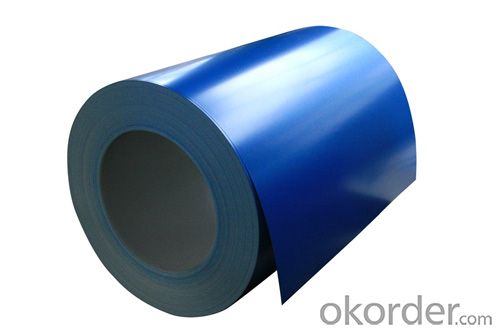
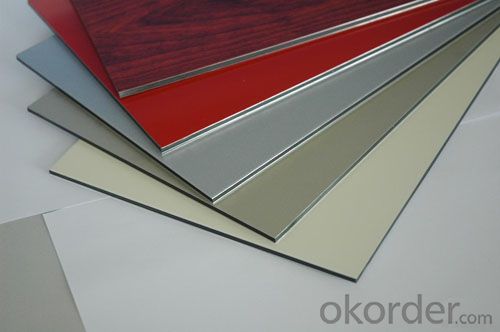
6. FAQ
1) What is your delivery time?
Our regular production time is over 30 days, It depends on the order quantity also.
2) What is your payment term?
We accept T/T, LC at sight, Usance LC 30, 60, 90, 120, 180 DAYS.
3) What is your price structure?
Our foil price is based on Shanghai Metal Price(SMM), not LME, but we could offer LME+ Conversion for your reference.
4) What is your Delivery term?
We do FOB, CFR, CIF, we don't do DDP.
5) Could you offer sample?
We could offer sample as your requirement. A4 Size sample is free for you, for bigger roll sample, it depends on the coil weight.
- Q: What’s the production standard of aluminum coil?
- GB/T3880-2006 mechanical standard GB/T3190-1996 chemical standard
- Q: Can aluminum coils be used in the manufacturing of cans?
- Yes, aluminum coils can be used in the manufacturing of cans. Aluminum coils are often used to produce the thin sheets of aluminum that are then formed into cans. The coils are typically processed through a series of steps, including rolling, annealing, and slitting, to create the desired thickness and width for can production. The aluminum sheets are then cut into appropriate sizes and shaped into the familiar cylindrical can shape. Aluminum is a popular choice for can manufacturing due to its lightweight, durable, and corrosion-resistant properties. It also provides a barrier to light, oxygen, and moisture, helping to preserve the quality and shelf life of the contents inside the cans. Overall, aluminum coils are an essential component in the manufacturing process of cans and play a significant role in the packaging industry.
- Q: What is the typical electrical resistivity of aluminum coils?
- Aluminum coils have an average electrical resistivity of around 2.65 x 10^-8 ohm-meters, showcasing their exceptional conductivity. This attribute renders them a top-notch option for electrical conductors. The remarkable conductivity enables an efficient flow of electric current within the coils, thereby reducing energy dissipation and heat production. Consequently, aluminum coils find extensive utilization in diverse electrical sectors, including transformers, motors, and generators.
- Q: Can aluminum coils be used in the production of aluminum louvers?
- Aluminum coils have the capability to be utilized in the manufacturing of aluminum louvers. These coils are a prevalent raw material in various industries, including the louver production sector. In order to meet the necessary strength and durability criteria, the aluminum coils undergo processing and shaping to match the required design for the louvers. This process also permits the customization and flexibility of louvers to meet specific demands. Moreover, aluminum, being a lightweight and corrosion-resistant material, is ideal for louvers that are exposed to outdoor conditions. Consequently, due to their multitude of benefits and suitability for this purpose, aluminum coils are extensively employed in the production of aluminum louvers.
- Q: Can aluminum coils withstand high temperatures?
- Yes, aluminum coils can withstand high temperatures. Aluminum has a high melting point of 660 degrees Celsius (1220 degrees Fahrenheit), making it suitable for applications where high temperatures are involved.
- Q: What are the different types of protective coatings for aluminum coils?
- Aluminum coils can benefit from various protective coatings to boost their durability and lifespan while safeguarding against environmental elements. 1. Polyester Coatings: With their exceptional UV ray and weather resistance, polyester coatings are widely utilized for aluminum coils. They offer vibrant color retention and a broad spectrum of color options, making them ideal for applications where aesthetics matter, such as in architecture. 2. Polyvinylidene Fluoride (PVDF) Coatings: Renowned for their exceptional resistance against fading, chalking, and chemical exposure, PVDF coatings are suitable for harsh environments. They exhibit high weatherability and can withstand extreme temperatures, making them commonly used in industrial and commercial settings. 3. Epoxy Coatings: Epoxy coatings present robust adhesion and excellent corrosion resistance. They act as a protective barrier against moisture and chemicals, making them well-suited for applications where the coils may encounter harsh conditions, particularly in marine and industrial settings. 4. Acrylic Coatings: Acrylic coatings offer good adhesion and flexibility. They provide moderate weather resistance and can be easily applied and repaired. Acrylic coatings find applications in various sectors, including automotive and general industrial uses. 5. Polyurethane Coatings: Polyurethane coatings showcase outstanding resistance to abrasion, chemicals, and weathering. They offer exceptional durability and are commonly employed in demanding applications where the coils may face harsh conditions or heavy wear. 6. Silicone Coatings: Silicone coatings boast remarkable resistance to extreme temperatures and UV exposure. They exhibit excellent weatherability and can endure prolonged exposure to sunlight without degradation. Silicone coatings are frequently utilized in automotive parts and outdoor equipment. The selection of the appropriate protective coating should be based on the specific requirements of the aluminum coils and the intended application. Factors to consider include the desired level of protection, appearance, and the environmental conditions to which the coils will be exposed.
- Q: What are the common surface finishes for aluminum coils in the aerospace industry?
- Some common surface finishes for aluminum coils in the aerospace industry include anodizing, chromate conversion coating, and primer coating. Anodizing is a process that creates a protective oxide layer on the surface of the aluminum, providing enhanced corrosion resistance and durability. Chromate conversion coating, also known as chemical film coating, forms a thin layer on the aluminum surface that provides corrosion resistance and improves adhesion for subsequent coatings. Primer coating is typically applied on top of anodizing or chromate conversion coating to provide additional protection and enhance the adhesion of subsequent paint layers. These surface finishes are important in the aerospace industry as they help to protect the aluminum coils from corrosion and ensure their longevity in harsh environments.
- Q: Foshan where there are high-quality aluminum and aluminum rolls for sale?
- If you know where to use, or what are the requirements of the words I can occasionally recommend you manufacturers give you, because I am in this industry!
- Q: Is it possible to use aluminum coil for crafting decorative items?
- <p>Yes, you can use aluminum coil to make a decoration piece. Aluminum is a versatile material that is lightweight, durable, and easy to manipulate. It can be bent, twisted, or cut into various shapes to create unique decorative items. Common uses include making sculptures, wall art, and even jewelry. Due to its malleability and resistance to corrosion, aluminum coil is an excellent choice for decorative purposes, especially for outdoor decorations where weather resistance is important.</p>
- Q: What are the necessary safety measures to be taken while handling and using aluminum coils?
- <p>When using aluminum coil, safety precautions include wearing appropriate personal protective equipment such as gloves and safety glasses to prevent cuts and eye injuries. Ensure good ventilation to avoid inhaling aluminum dust or fumes. Keep the work area clean and free from clutter to prevent tripping hazards. Use proper tools to handle the coils to avoid strain or injury. Be cautious of electrical hazards if the aluminum coil is being used in conjunction with electrical equipment. Always follow the manufacturer's guidelines for safe operation and storage of aluminum coils.</p>
Send your message to us
Aluminum Coil Minnesota Painted Aluminium Sheets Plates for Wall Decorations
- Loading Port:
- China main port
- Payment Terms:
- TT OR LC
- Min Order Qty:
- 3 m.t.
- Supply Capability:
- 5000 m.t./month
OKorder Service Pledge
OKorder Financial Service
Similar products
Hot products
Hot Searches
Related keywords
